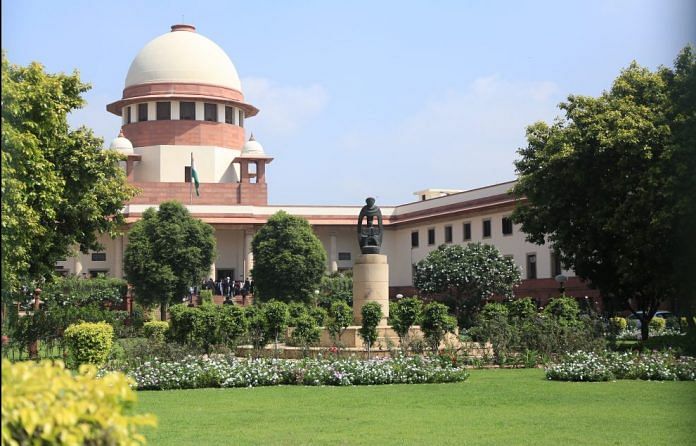New Delhi: The Supreme Court has rejected the disability pension demand of a former Army man who injured himself while on casual leave — a ruling that adds to the debate on giving special treatment to military personnel with medical conditions acquired while in service.
A bench comprising Justices L. Nageswara Rao and Hemant Gupta delivered the judgment on 20 September while hearing the case of Dharambir Singh, who was discharged from the Territorial Army in December 1999.
The Territorial Army is the second line of defence after the regular Indian Army.
Singh had suffered injuries in an accident that took place after he lost control over his scooter on his way to buy electrical goods for his sister.
The Supreme Court ruled that Singh would not be entitled to disability pension because his injury “even remotely has no causal connection with the military service”.
“Since the accident has occurred when the respondent was purchasing household articles, it cannot be said that there is any causal connection between the injury and the military service,” the court observed.
Armed Forces Tribunal allowed claim for disability pension
While relieving Singh, the Army’s Medical Board had rejected his claim for disability pension, ruling that his disability was “neither attributable nor aggravated by military service”.
The Armed Forces Tribunal, Chandigarh, however, overturned the Medical Board’s decision and ruled that Singh was entitled to disability pension. The tribunal relied on a 1999 apex court judgment delivered in Madan Singh Shekhawat vs Union of India and Ors case in which it had allowed grant of disability pension to an army officer who met with an accident when he was travelling to his hometown from where he was posted, while on casual leave.
This order was challenged by the central government in the Supreme Court. The government argued that although the officer would be treated to be on duty even if he was on casual or annual leave, the injuries suffered by him must have “causal connection as attributable to or aggravated by military service”.
Also read: Top IPS officer wants to stop risk allowance for CRPF personnel with medical conditions
Injury must be connected to military service, says SC
The Supreme Court last week ruled that armed forces personnel are to be treated on duty when they take casual or annual leaves, but added the injury or death must be connected with military service — no matter how remote the connection might be.
Rejecting Singh’s claim for disability pension, the SC said, “The injury or death must be intervention of armed service and not an accident which could be attributed to risk common to human beings. When a person is going on a scooter to purchase household articles, such activity, even remotely, has no causal connection with the military service.”
The court also clarified that the judgment in Madan Singh Shekhawat and other similar cases was different, owing to the fact that the injuries or deaths in those cases occurred while returning from or going for leave. This, the SC said, had a causal connection with military service, unlike Singh’s case.
SC refused to accept Court of Inquiry’s decision
A senior army officer, who did not wish to be named, told ThePrint that whenever a military personnel is injured, a Court of Inquiry (CoI) ascertains if the injury is attributable to military service.
“The decision of the CoI in this regard is final. The CoI investigates the circumstances under which a military personnel has suffered injuries or disabilities, and bases its judgment report on that,” the officer said.
In Singh’s case, the CoI said that his injury was attributable to military service. But the Supreme Court refused to accept the finding of the CoI.
“The percentage of disability as well as whether the disability is attributed to or aggravated by military service has to be assessed by the Medical Board. The purpose of CoI is to examine the conduct of the personnel of the Armed Forces, whereas, the Medical Board examines the causal connection with the injury with the military services and also the extent of disability. Thus, the CoI and the opinion of the Medical Board both have different objects and purposes to achieve,” SC observed.
Another senior army officer told ThePrint on condition of anonymity that the Supreme Court judgment is welcome as it may reduce the number of claims for disability benefits, which are not attributable to military service.
“However, this may also increase the number of litigations as personnel suffering some kind of disability during leave may declare it later or suggest that military service had aggravated any such disability,” the officer said.
Also read: Problem isn’t taxing disability pension of Armed forces, but demonising disability
Recommendations on disability pension policy
The Army has proposed several changes to the disability pension policy, citing cases of misuse of the existing policy. In its latest set of recommendations, the Army Headquarters had suggested that disability pension should be taxed for all military personnel, except for those who have been injured in battles.
The recommendation came after a circular issued by the Central Board of Direct Taxes on 24 June declared that disability pension would be taxed, leading to outrage within the armed forces, particularly among the veterans.
The Army Headquarters is also learnt to have proposed that the premium on the Ex-servicemen Contributory Health Scheme (ECHS) should be calculated on the percentage of a soldier’s disability.
It further proposed to minimise the distinction between ‘field’ and ‘peace’ postings of personnel while calculating the disability pension, and less disparity in the disability pension between officers and personnel below officer rank (PBOR).
The recommendations have been submitted to the Ministry of Defence and are, currently, being studied.




Nivedan hai ki govt employees ki vidhva or tlakshuda betiyo ko family penshion Dee jati hai Jo beto ke moulik or kanuni adhikaro ka hanan hai aap sansd ka vishesh satr bulakr ak aisa bill pass krvaye jisse beto ko bhi family penshion ka labh mil ske